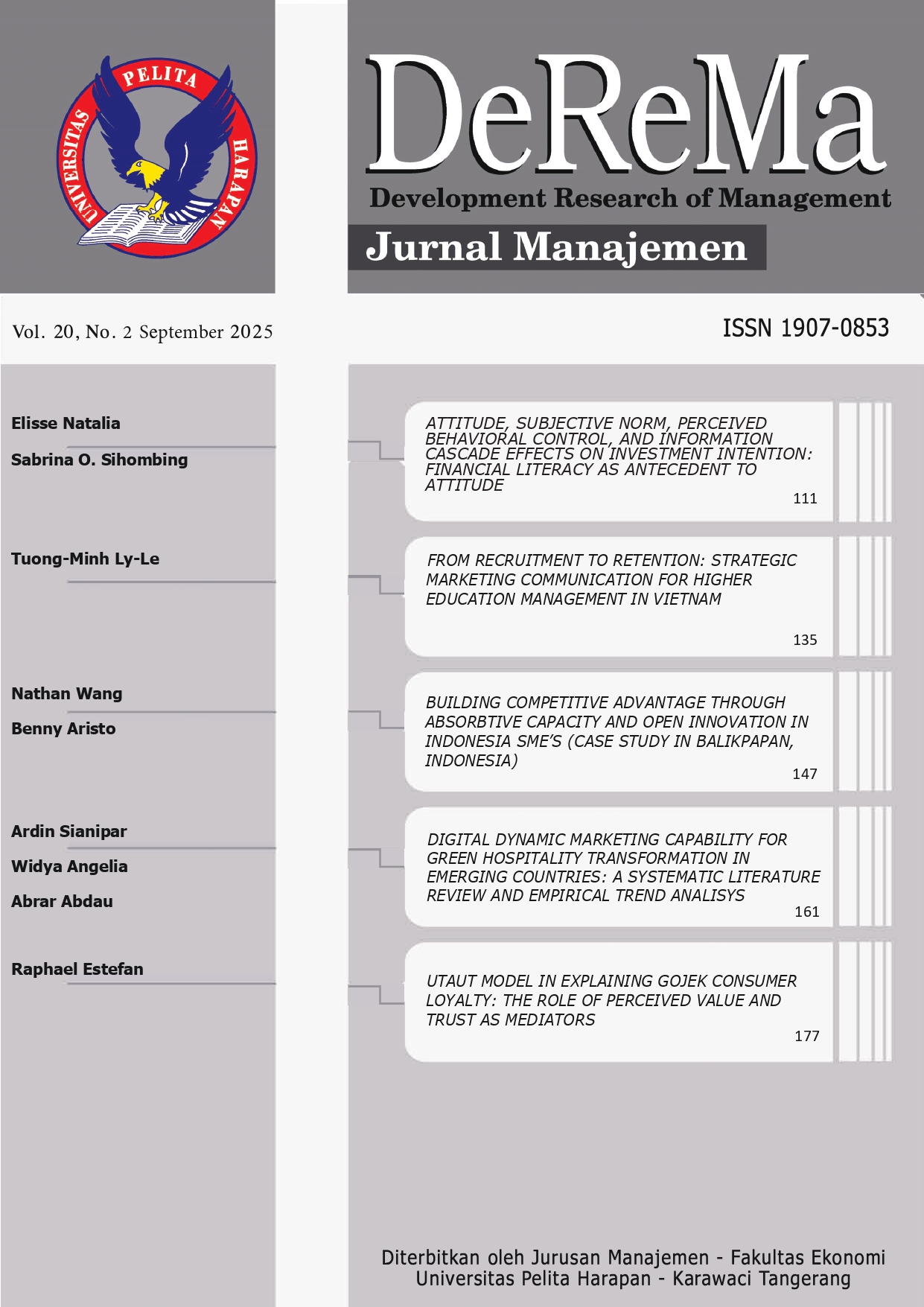DIGITAL DYNAMIC MARKETING CAPABILITY FOR GREEN HOSPITALITY TRANSFORMATION IN EMERGING COUNTRIES : A SYSTEMATIC LITERATURE REVIEW AND EMPIRICAL TREND ANALISYS
DOI:
https://doi.org/10.19166/derema.v20i2.10244Trefwoorden:
Digital Dynamic Marketing Capability , Green Hospitality, Emerging Countries, Systematic literature review, sustainability marketing, Digital Transformation in TourismSamenvatting
This study explores the role of Digital Dynamic Marketing Capability (DDMC) in advancing green hospitality in emerging countries by integrating theoretical and empirical insights. A Systematic Literature Review (SLR) following the PRISMA protocol analyzed 30 peer-reviewed articles from 2020 to 2024, sourced from Scopus and Web of Science, and supplemented by empirical data from WTTC, UNWTO, and Statista to validate trends. The findings highlight four key themes: technological adaptability, sustainability-driven digital communication, organizational agility, and customer eco-engagement. DDMC strengthens branding, fosters eco-innovation, and enhances service personalization, though its adoption, particularly of advanced technologies like AI and blockchain, varies across regions due to infrastructural and resource disparities. The study’s reliance on secondary data limits its ability to establish direct causal relationships, suggesting a need for further empirical research. Practically, it offers strategic insights for hospitality leaders and policymakers to develop adaptive, sustainable marketing practices that align with eco-hospitality goals. By extending dynamic capabilities theory to green digital marketing, this paper contributes an original conceptual framework tailored to the unique challenges and opportunities of emerging markets, providing a roadmap for sustainable transformation in the hospitality sector.
Abstrak dalam Bahasa Indonesia : Studi ini mengeksplorasi peran Digital Dynamic Marketing Capability (DDMC) dalam memajukan green hospitality di negara berkembang melalui integrasi wawasan teoretis dan empiris. Systematic Literature Review (SLR) dengan protokol PRISMA menganalisis 30 artikel peer-reviewed periode 2020–2024 yang bersumber dari Scopus dan Web of Science, serta dilengkapi dengan data empiris dari WTTC, UNWTO, dan Statista untuk memvalidasi tren. Temuan penelitian menyoroti empat tema utama: kemampuan beradaptasi terhadap teknologi, komunikasi digital berorientasi keberlanjutan, kelincahan organisasi, dan keterlibatan pelanggan dalam isu lingkungan. DDMC memperkuat branding, mendorong inovasi ramah lingkungan (eco-innovation), dan meningkatkan personalisasi layanan, meskipun adopsinya—terutama pada teknologi maju seperti AI dan blockchain—bervariasi antar wilayah akibat perbedaan infrastruktur dan sumber daya. Ketergantungan studi ini pada data sekunder membatasi kemampuannya dalam menetapkan hubungan kausal langsung, sehingga diperlukan penelitian empiris lanjutan. Secara praktis, studi ini memberikan wawasan strategis bagi para pemimpin industri perhotelan dan pembuat kebijakan untuk mengembangkan praktik pemasaran adaptif dan berkelanjutan yang selaras dengan tujuan eco-hospitality. Dengan memperluas teori dynamic capabilities ke dalam pemasaran digital berkelanjutan, penelitian ini menawarkan kerangka konseptual orisinal yang disesuaikan dengan tantangan dan peluang unik di pasar negara berkembang, sekaligus memberikan peta jalan bagi transformasi berkelanjutan di sektor perhotelan.
Referenties
Al-Husain, R. A., Elshaer, A. M., Alzuman, A., Albadry, O. M., Sheikhelsouk, S., Al-Monawer, N. S., & Alsetoohy, O. (2024). Toward sustainable performance in the hotel food supply chain: Influences of quality management practices and digital integration. Administrative Sciences, 14(12), 314. https://doi.org/10.3390/admsci14120314
Bekele, H., Raj, S., Singh, A., Joshi, M., & Kajla, T. (2024). Digital transformation and environmental sustainability in the hospitality industry: A three-wave time-lagged examination. Journal of Cleaner Production, 144263. https://doi.org/10.1016/j.jclepro.2024.144263
Braun, V., & Clarke, V. (2021). One size fits all? What counts as quality practice in (reflexive) thematic analysis? Qualitative Research in Psychology, 18(3), 328–352. https://doi.org/10.1080/14780887.2020.1769238
Castilho, D., & Fuinhas, J. A. (2025). Exploring the effects of tourism capital investment on income inequality and poverty in the European Union countries. Journal of Economic Structures, 14(1), 6. https://doi.org/10.1186/s40008-025-00349-2
Chang, Y.-C., & Chen, Y. (2022). Integrating dynamic capabilities for sustainability in tourism firms. Sustainable Development, 30(4), 874–886. https://doi.org/10.1002/sd.2289
Chasapi, D., Markou, A., & Petropoulos, P. (2024). The role of digital infrastructure and technology capital in enhancing agility in green hotels. Tourism Management Perspectives, 50, 101134. https://doi.org/10.1016/j.tmp.2024.101134
Chinakidzwa, M., & Phiri, M. A. (2020). Impact of digital marketing capabilities on market performance of small to medium enterprise agro-processors in Harare, Zimbabwe. Verslas Teorija Ir Praktika, 21(2), 746. https://doi.org/10.3846/btp.2020.12149
Domingo, R., & Roldan, M. (2022). Social media strategies for green hotel positioning in the Philippines. Journal of Vacation Marketing, 28(2), 239–256. https://doi.org/10.1177/13567667221086957
Dwivedi, A., Johnson, L. W., & McDonald, R. E. (2021). Gamification and eco-consumer behaviour in emerging markets. Psychology & Marketing, 38(5), 789–803. https://doi.org/10.1002/mar.21472
Entrepreneurship and Sustainability Issues. (2024). Journal of Entrepreneurship and Sustainability Issues. https://doi.org/10.9770/jesi
Floričić, T. (2020). Sustainable solutions in the hospitality industry and competitiveness context of “green hotels”. Civil Engineering Journal, 6(6), 1104-1113. http://dx.doi.org/10.28991/cej-2020-03091532
García-Muiña, F. E., et al. (2021). Digital maturity and green innovation in the hotel industry. Journal of Innovation & Knowledge, 6(3), 213–222. https://doi.org/10.1016/j.jik.2020.11.001
Ghosh, S., & Chowdhury, S. (2023). AI-driven personalization in green hospitality: Evidence from Indian eco-resorts. Journal of Hospitality and Tourism Technology, 14(1), 112–130. https://doi.org/10.1108/JHTT-01-2022-0034
Hamdan, M., & Alharbi, A. (2022). Digital marketing capability and sustainable value creation in hospitality. Tourism Economics, 28(4), 791–808. https://doi.org/10.1177/13548166221089174
Hermawan, A., & Fitriani, Y. (2020). Capabilities for green value co-creation via digital tools in tourism. Sustainability, 12(3), 1085. https://doi.org/10.3390/su12031085
Hossain, M. S., & Rahman, M. F. (2024). Policy gaps in digital green marketing: A comparative study of Southeast Asian hospitality sectors. Sustainability, 16(3), 1125. https://doi.org/10.3390/su16031125
Juma, A., & Mahmud, H. (2021). Cloud technology and sustainability communication in African hotels. Journal of Hospitality & Tourism Research, 45(6), 945–965. https://doi.org/10.1177/10963480211009347
Kamyabi, M., Özgit, H., & Ahmed, J. N. (2025). Sustaining digital marketing strategies to enhance customer engagement and brand promotion: Position as a moderator. Sustainability, 17(7), 3270. https://doi.org/10.3390/su17073270
Khan, M., & Yu, Z. (2021). Green innovation and sustainable development in emerging economies. Technological Forecasting and Social Change, 165, 121235. https://doi.org/10.1016/j.techfore.2021.121235
Khatter, A. (2025). Leveraging technology for environmental sustainability in the hospitality sector: Innovations and strategies. Corporate Social Responsibility and Environmental Management. https://doi.org/10.1002/csr.3200
Kumar, V., Sharma, A., & Gupta, S. (2021). Digital marketing capabilities in emerging economies: The role of resource scarcity and institutional voids. Journal of Business Research, 130, 382–394. https://doi.org/10.1016/j.jbusres.2021.03.045
Li, X., & Zhang, Y. (2022). How green hotels use social media for sustainable branding: Evidence from China and India. Tourism Management, 89, 104456. https://doi.org/10.1016/j.tourman.2021.104456
Lukose, J. M., & Agbeyangi, A. O. (2025). Enhancing ICT literacy and sustainable practices in the rural hospitality industry: Key insights and implications. Journal of Infrastructure Policy and Development, 9(2), Article 11425. https://doi.org/10.24294/jipd11425
Makoondlall-Chadee, T., & Bokhoree, C. (2024). Environmental sustainability in hotels: A review of the relevance and contributions of assessment tools and techniques. https://doi.org/10.20944/preprints202408.0638.v1
Meeroff, D. E., Scarlatos, P. D., Bloetscher, F., & Sobel, L. (2020). Implementation of sustainability practices in the hospitality industry. Journal of Service Science and Management, 13(2), 189. https://doi.org/10.4236/jssm.2020.132013
Michelotto, F., & Jóia, L. A. (2024). Organizational digital transformation readiness: An exploratory investigation. Journal of Theoretical and Applied Electronic Commerce Research, 19(4), 3283. https://doi.org/10.3390/jtaer19040159
Moghavvemi, S., et al. (2020). The impact of digital marketing adoption on hotel performance in developing countries. Information Systems Frontiers, 22(1), 245–263. https://doi.org/10.1007/s10796-019-09952-4
Moher, D., Liberati, A., Tetzlaff, J., & Altman, D. G. (2020). Preferred reporting items for systematic reviews and meta-analyses: The PRISMA statement. PLOS Medicine, 6(7), e1000097. https://doi.org/10.1371/journal.pmed.1000097
Morales, J., & Silva, R. (2021). Mobile marketing effectiveness in promoting eco-hospitality in Latin America. Journal of Hospitality and Tourism Technology, 12(3), 456–475. https://doi.org/10.1108/JHTT-07-2020-0156
Nurdiansyah, H., & Putri, D. (2023). Evaluating digital marketing agility in Indonesian eco-tourism. Tourism Planning & Development, 20(4), 481–499. https://doi.org/10.1080/21568316.2023.2214567
Okano, M. T., Santos, H. D. C. L. D., & Ursini, E. L. (2022). The digital platform as digital innovation: A study from the dynamic capabilities perspective. International Journal of Innovation and Technology Management, 19(03), 2140014. https://doi.org/10.1142/S0219877021400149
Oliveira, D., & Costa, A. (2022). The impact of green digital transformation on hotel reputation in Brazil. Journal of Cleaner Production, 364, 130048. https://doi.org/10.1016/j.jclepro.2022.130048
Page, M. J., McKenzie, J. E., Bossuyt, P. M., Boutron, I., Hoffmann, T. C., Mulrow, C. D., ... & Moher, D. (2021). The PRISMA 2020 statement: An updated guideline for reporting systematic reviews. BMJ, 372, n71. https://doi.org/10.1136/bmj.n71
Papallou, E., Katafygiotou, M., & Dimopoulos, T. (2024). Emerging sustainability trends in tourist facilities: A comparative assessment of multiple hotels and resorts. Sustainability, 16(9), 3536. https://doi.org/10.3390/su16093536
Patwary, A. K., Tosun, C., Sharif, A., Ismail, N. A., & Abuelhassan, A. E. (2024). Measuring sustainable business performance in Malaysian hotels: The roles of green information, green innovation strategic orientation, and digital technology implementation. International Journal of Hospitality Management, 123, 103935. https://doi.org/10.1016/j.ijhm.2024.103935
Prayag, G., Chowdhury, M., & Spector, S. (2022). Dynamic capabilities and disaster resilience in hotels: The role of digital marketing. Annals of Tourism Research, 92, 103324. https://doi.org/10.1016/j.annals.2021.103324
Prayag, G., Chowdhury, M., Spector, S., & Orchiston, C. (2018). Organizational resilience and financial performance. Annals of Tourism Research, 73, 193–196. https://doi.org/10.1016/j.annals.2018.06.006
Rahman, M. S., & Karim, M. M. (2021). Blockchain for transparency in green hospitality supply chains: A study from Bangladesh. Journal of Cleaner Production, 280, 124613. https://doi.org/10.1016/j.jclepro.2020.124613
Rosalina, P. D., Dupré, K., & Ying, W. (2021). Rural tourism: A systematic literature review on definitions and challenges. Journal of Hospitality and Tourism Management, 47, 134. https://doi.org/10.1016/j.jhtm.2021.03.001
Ruiz-Fernández, L., Rienda, L., & Marco-Lajara, B. (2024). Hotel chains and sustainable development: Degree of internationalization, SDGs and dynamic capabilities as drivers of successful performance. Environment, Development and Sustainability. Advanced online publication. https://doi.org/10.1007/s10668-024-04721-3
Sánchez-Ollero, J. L., García-Pozo, A., & Marchante-Mera, A. (2023). Digital communication of sustainability in Latin American hotels: Barriers and opportunities. Journal of Sustainable Tourism, 31(2), 1–20. https://doi.org/10.1080/09669582.2022.2052217
Sharafuddin, M. A., Madhavan, M., & Wangtueai, S. (2024). Assessing the effectiveness of digital marketing in enhancing tourist experiences and satisfaction: A study of Thailand’s tourism services. Administrative Sciences, 14(11), 273. https://doi.org/10.3390/admsci14110273
Sigala, M. (2020). Tourism and COVID-19: Impacts and implications for advancing digital sustainability. International Journal of Contemporary Hospitality Management, 32(3), 877–905. https://doi.org/10.1016/j.jbusres.2020.06.015
Snyder, H. (2019). Literature review as a research methodology: An overview and guidelines. Journal of Business Research, 104, 333–339. https://doi.org/10.1016/j.jbusres.2019.07.039
Statista. (2024). The adoption rate of AI, CRM, and blockchain in the hospitality sector worldwide (2020–2024). https://www.statista.com/statistics/ai-crm-blockchain-hospitality-global/
Sultan, M. T., Sharmin, F., Bădulescu, A., Ştiubea, E., & Xue, K. (2020). Travellers’ responsible environmental behavior towards sustainable coastal tourism: An empirical investigation on social media user-generated content. Sustainability, 13(1), 56. https://doi.org/10.3390/su13010056
Teece, D. J. (2018). Dynamic capabilities and (digital) platform lifecycles. Strategic Management Journal, 39(1), 43–71. https://doi.org/10.1002/smj.2734
Tran, Q., & Nguyen, T. (2020). Smart tourism ecosystems and green capabilities in Southeast Asia. Technological Forecasting and Social Change, 161, 120188. https://doi.org/10.1016/j.techfore.2020.120188
United Nations World Tourism Organization. (2023). Regional Sustainability Dashboard 2023. https://www.unwto.org/sustainability-dashboard
Villamediana, L., et al. (2023). The digital transformation of sustainability communication in hotels. Journal of Hospitality and Tourism Management, 54, 1–11. https://doi.org/10.1016/j.jhtm.2023.01.002
Wangsa, I. H. S., Sulastri, S., Shihab, M. S., & Yuliani, Y. (2025). Value creation in the green dynamic marketing capability: The role of organizational learning and green innovation. Journal of Infrastructure Policy and Development, 9(1), Article 7427. https://doi.org/10.24294/jipd7427
World Economic Forum. (2023). Digital Readiness Index: Measuring global progress. https://www.weforum.org/reports/digital-readiness-index-2023/
World Travel & Tourism Council. (2024). Global trends report: Sustainability and technology in tourism. https://wttc.org/research/global-trends-2024
Zhang, H., Ding, H., & Xiao, J. (2023). How organizational agility promotes digital transformation: An empirical study. Sustainability, 15(14), 11304. https://doi.org/10.3390/su151411304
##submission.downloads##
Gepubliceerd
Nummer
Sectie
Licentie
Copyright (c) 2025 Ardin Sianipar, Widya; Abrar

Dit werk wordt verdeeld onder een Naamsvermelding-GelijkDelen 4.0 Internationaal licentie.
Authors who publish with this journal agree to the following terms:
1) Authors retain copyright and grant the journal right of first publication with the work simultaneously licensed under a Creative Commons Attribution License (CC-BY-SA 4.0) that allows others to share the work with an acknowledgement of the work's authorship and initial publication in this journal.
2) Authors are able to enter into separate, additional contractual arrangements for the non-exclusive distribution of the journal's published version of the work (e.g., post it to an institutional repository or publish it in a book), with an acknowledgement of its initial publication in this journal.
3) Authors are permitted and encouraged to post their work online (e.g., in institutional repositories or on their website). The final published PDF should be used and bibliographic details that credit the publication in this journal should be included.





